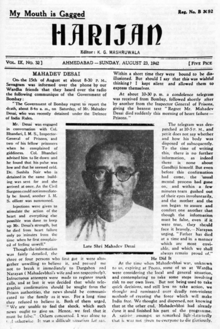Harijan
Harijan (Hindustani: हरिजन (Devanagari), ہریجن (Nastaleeq); translation: "person of Hari/Vishnu") is a term popularized by Indian revolutionary leader Mahatma Gandhi for referring to Dalits, traditionally considered to be Untouchable. However the euphemism is now regarded as condescending by many,[1] with some Dalit activists calling it insulting.[2] As a result, the Government of India and several state governments forbid or discourage its use for official purposes.[3]
Though Gandhi popularized the term harijan, which literally meant children of god, it was coined by the Gujarati Bhakti era poet-saint Narsi Mehta,[4][5] to refer to the children of Devadasis.[6][7][8] According to other source the medieval devotional poet Gangasati used the term to refer to herself during the Bhakti movement, a period in India that gave greater status and voice to women while challenging the legitimacy of caste. Gangasati lived around the 12th-14th centuries and wrote in the Gujarati language.[9]

Harijan, Mohandas Gandhi's publication
Gandhi started publishing a weekly journal of the same name on 11 February 1932 from Yerwada Jail during British rule.[10] He created three publications: Harijan in English (from 1933 to 1948), Harijan Bandu in Gujarati,[11] and Harijan Sevak in Hindi.[12] These newspapers found Gandhi concentrating on social and economic problems, much as his earlier English newspaper, Young India, had done from 1919 to 1932.[13]
See also
- Indian Opinion (Gandhi's newspaper originally published during his time in South Africa)
- Gandhi Heritage Portal
References
| Wikimedia Commons has media related to Harijan. |
- ↑ Jenkins, Laura Dudley (November 2003). "Another "People of India" Project: Colonial and National Anhropology". The Journal of Asian Studies. Association for Asian Studies. 62 (4): 1143–1170. JSTOR 3591762. doi:10.2307/3591762. (Subscription required (help)).
- ↑ "Use of word `Harijan' objected". The Hindu. 27 September 2003. Retrieved 6 April 2015.
- ↑ "Government bans use of word Harijan". Indian Express. 15 January 2013. Retrieved 6 April 2015.
- ↑ "Origin of name 'Harijan'". mkgandhi.org. Retrieved 18 April 2014.
- ↑ B. N. Srivastava (1997). Manual Scavenging in India: A Disgrace to the Country. Concept Publishing Company. p. 15. ISBN 9788170226390.
- ↑ Hoiberg, Dale (2000). Students' Britannica India: Select essays, Volume Six. New Delhi: Popular Prakashan. ISBN 9780852297629.
- ↑ "Slaves of circumstance". The Hindu. Retrieved 2017-07-19.
- ↑ Jammanna, Akepogu; Sudhakar, Pasala (2016-12-14). Dalits' Struggle for Social Justice in Andhra Pradesh (1956-2008): From Relays to Vacuum Tubes. Cambridge Scholars Publishing. ISBN 9781443844963.
- ↑ "The Sacred and Profane in the Bhakti Religious Tradition." Women Writing in India, vol 1. Tharu & Lalita, eds. Feminist Press at CUNY, 1993.
- ↑ Archives of Harijan 11 February 1933
- ↑ Harijan Bandu
- ↑ Harijan Sevak
- ↑ Gandhi As A Journalist